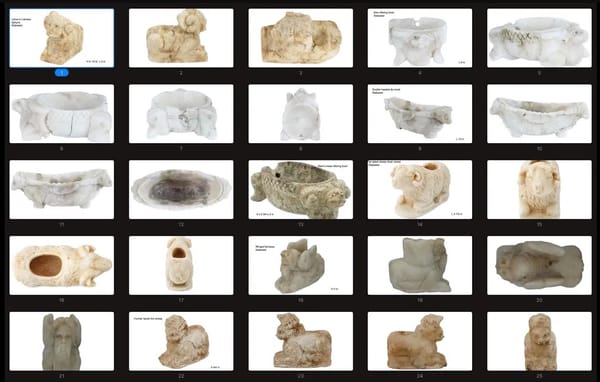Discussions: Gendered Speech in the Classroom
Dr. Josh Stout briefly discusses the use of gendered speech in the classroom.

What follows is an impromptu short discussion, with more to come on this in the future.
Please scroll down for links below the transcript. This is lightly edited AI generated transcript and there may be errors.
Eric 0:07
I wanted to ask you a question. I just it's fascinating that you when you you talked about gender references and you then had to make a you had to kind of. I just wanted to talk about this. I don't know that recording it is going to be necessary, but you talked about the use like I'm making gendered references and then you kind of apologized for that and talked about when you you know, when when you talk about that in class, do you have to backtrack that when you say, you know, a father and a mother raising a kid in class, do you then say, all right, I'm a biologist. This is why.
Dr. Josh Stout 0:43
I feel a should I really feel I should do students.
Eric 0:46
Too. So how do students respond?
Dr. Josh Stout 0:48
Like, they appreciate it.
Eric 0:49
They do.
Dr. Josh Stout 0:50
They appreciate it. No, because the majority of students are also in this binary world. They are living in a male dominated.
Eric 0:59
Whether.
Dr. Josh Stout 1:00
Or not binary world.
Eric 1:01
Or not, they are binary. They are living in a binary world yet.
Dr. Josh Stout 1:04
And most of them sort of follow that world. If they're a female, they're going to date a male, and a male is going to date a female, but not all of them. So more common than non-binary people are people who are gay, who might be a woman dating woman or a man dating a man. And so I have more of those students that I'm going to have someone who is completely non-binary. Mm hmm. So far, I have not had any non-binary people in my class, but we're so much more aware of it that students want to hear about this.
Eric 1:36
So rather than so soon, what you're saying is it's just out of your mouth comes a mother and a father raising a baby. You don't you haven't been able to change that to two people raising a baby.
Dr. Josh Stout 1:47
It sounds strange as a biologist to talk about. And so I want I want to I want to I want to at least have the students have cognitive dissonance.
Eric 1:55
Do you do you think, though, that in 25 years a professor in your position will be saying to people having a baby just completely naturally without feeling that it's.
Dr. Josh Stout 2:02
I don't know about that. We have a lot of cultural baggage that will be with us for a while. I think that it's necessary to draw attention to the bias in our narratives, and I am telling narratives, and I warn the students from day one, first thing out of my mouth is I will tell you stories. They will sound plausible because they're based on facts, but they are still stories. And I'm choosing the facts to fit my stories. And we have to understand that the male female dynamic, this binary is a narrative and it is not necessary. It is something that is part of our long term narrative. And we have to realize that this is a form of bias. And so I try to approach it that way. And so I talk about things like, oh, until 2017, we thought that women had zero percentage of hunting in hunter gatherer societies, and now we're looking back at the same papers and realizing that we just didn't call what women did hunting.
Eric 3:04
I just I guess what I was getting at was, was in your mid-fifties, you say, you know, a man and a father and a mother having a baby and then you're like, oh, but like, I understand that not every family is like that. So I just, you know, and you have to backtrack that. Yeah. I'm wondering how the students respond to you rather than coming out with a non gendered sentence that you don't have to then backtrack on. I'm just wondering what the response to that was. You're saying they appreciate they appreciated who you are. Yeah. The fact that you're acknowledging that.
Dr. Josh Stout 3:35
Well, it's more than that because the narratives I tell tend to reinforce cultural stereotypes. And so I really don't want to reinforce the male getting the resources and bringing them back to the female doing so.
Eric 3:49
You're saying you don't you're not the purpose of them. The purpose of your narrative is not to reinforce the stereotype in some other purpose, but it sounds like it's exactly so.
Dr. Josh Stout 3:59
I keep reminding the students that there is this problem and it's it's wider than that. So it's exactly what you're talking about. The very class oriented story I just told where it's all about getting your kids into college. That doesn't apply to everyone all the time. It definitely applies to my students and they they are nodding. But I but I remind them that the world is not like that for everyone. And, you know, many of them are from India. About a third of my class is from India. Wow. And so they are very aware that there are people who are having large families and those families are not going to college and they are still farmers.
Eric 4:38
And so everything you're saying is wrong.
Dr. Josh Stout 4:41
Yeah, exactly. So, so so I have to I have to say, look, these are narratives that are for for a particular time and place, and they're they're there because of my particular background and where we're coming from. But that they should be questioning these narratives and that these narratives do tend to reinforce certain biases. So anyway, we can talk about that as our whole thing, but not today. All right.
Links
Theme Music
Theme music by
sirobosi frawstakwa






